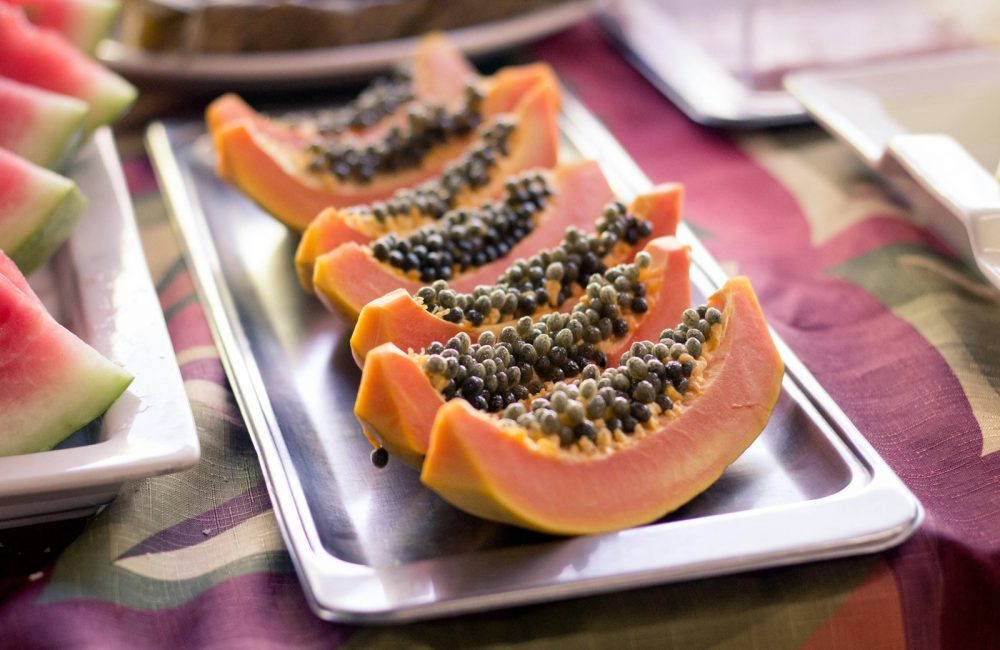Papaya, often referred to as the “fruit of the angels,” is a tropical fruit that is not only delicious but also incredibly nutritious. This vibrant orange fruit is packed with essential vitamins, minerals, antioxidants, and enzymes that support various aspects of children’s growth, immunity, digestion, and development. Papaya’s soft texture and sweet flavor make it an ideal fruit for children, providing them with natural sugars and a host of health benefits in a tasty package. In this article, we’ll dive into the 12 best health benefits of papaya for children, detailing why it’s a powerful addition to their diet.
1. Boosts Immune System
One of the most notable benefits of papaya for children is its high content of vitamin C, an antioxidant that plays a critical role in supporting the immune system. Vitamin C enhances the production of white blood cells, which act as the body’s primary defense against infections and illnesses. For children, who are frequently exposed to germs at school and during playtime, a strong immune system is essential for avoiding common ailments like colds, flu, and other infections.
Beyond vitamin C, papaya contains other antioxidants, such as beta-carotene, that reduce inflammation and strengthen the immune system. Regular consumption of papaya can help build immunity and improve children’s resilience against seasonal sicknesses, keeping them healthy and energetic year-round.
2. Supports Digestive Health
Papaya is rich in dietary fiber and contains a unique enzyme called papain, both of which contribute to excellent digestive health. Fiber adds bulk to the stool, promoting regular bowel movements and preventing constipation—a common digestive issue in children. Papain, on the other hand, aids in the breakdown of proteins, making it easier for the body to digest food efficiently.
For children who may experience occasional digestive discomfort or bloating, papaya offers a natural and gentle solution to support digestion. The fiber in papaya also acts as a prebiotic, promoting the growth of beneficial bacteria in the gut, which is crucial for overall digestive health. By including papaya in their diet, you can help children maintain a healthy digestive system and ensure they are absorbing nutrients effectively.
3. Promotes Healthy Skin
Papaya is a natural source of vitamins A, C, and E, all of which contribute to healthier, more radiant skin. Vitamin C supports collagen production, a protein that keeps skin firm and elastic, helping prevent dryness and minor skin issues. Vitamin A promotes cell turnover and skin repair, keeping the skin smooth and resilient. For children, this combination of vitamins helps maintain soft, hydrated skin that can better withstand environmental factors like sun exposure and pollution.
In addition to its internal benefits, mashed papaya can also be used topically as a gentle moisturizer to soothe dry or irritated skin. The enzymes and antioxidants in papaya make it a great choice for supporting children’s skin health from the inside out, providing them with a natural way to maintain a healthy complexion.
4. Enhances Vision and Eye Health
Papaya is rich in vitamin A and beta-carotene, both of which are essential for eye health. Vitamin A plays a crucial role in maintaining good vision, especially in low-light conditions, and it helps prevent conditions like night blindness. Beta-carotene, a precursor to vitamin A, further supports vision by protecting the retina and reducing the risk of age-related eye problems.
For children who may spend extended periods in front of screens, the vitamin A and beta-carotene in papaya provide essential support for eye health and help prevent eye strain. Including papaya in their diet not only enhances vision but also protects their eyes from potential damage caused by blue light exposure.
5. Boosts Energy Levels
Papaya is an excellent source of natural sugars, such as glucose, fructose, and sucrose, which provide a quick and sustainable energy boost. For active children who need the energy to fuel their playtime, studies, and other activities, papaya is a fantastic option. Unlike processed sugary snacks, the natural sugars in papaya are absorbed gradually, providing children with steady energy without the risk of sugar crashes.
In addition to natural sugars, papaya contains B vitamins, such as folate and vitamin B6, which play a role in converting food into energy. These vitamins support metabolism and energy production, helping children stay active, focused, and alert throughout the day.
6. Supports Healthy Bone Development
Papaya contains essential minerals like calcium, magnesium, and potassium, all of which contribute to healthy bone development. Calcium is essential for bone density and strength, and potassium aids in calcium retention, ensuring that bones remain strong and resilient as children grow. Magnesium also plays a role in bone health by supporting the structural integrity of bones.
For growing children, it’s important to maintain proper levels of these minerals to ensure their skeletal development is on track. By including papaya in their diet, you can support children’s bone health, helping to lay a strong foundation for growth, physical activities, and overall mobility.
7. Promotes Heart Health
Papaya is a heart-healthy fruit due to its high content of fiber, potassium, and antioxidants. Potassium helps regulate blood pressure by balancing sodium levels and relaxing blood vessels. Fiber also plays a role in heart health by helping to reduce cholesterol levels, which is especially important for children with a family history of heart disease.
The antioxidants in papaya, such as lycopene and beta-carotene, further protect the heart by reducing inflammation and oxidative stress, both of which can contribute to heart-related issues later in life. Starting heart-healthy habits early, such as eating potassium and fiber-rich foods like papaya, can promote long-term cardiovascular wellness.
8. Supports Healthy Weight Management
Papaya is a low-calorie and nutrient-dense fruit, making it an ideal choice for children who may need energy without excess calories. The fiber in papaya promotes satiety, helping children feel full longer and reducing the likelihood of reaching for high-calorie snacks. This makes papaya a healthy option for children learning portion control and establishing good eating habits.
Moreover, the natural sweetness of papaya satisfies cravings for sugary foods, offering a healthier alternative to processed snacks and desserts. By including papaya in a balanced diet, children can enjoy a nutritious, filling snack that supports healthy weight management without compromising on flavor or nutrition.
9. Reduces Inflammation
Papaya has natural anti-inflammatory properties due to its rich antioxidant content, including beta-carotene, vitamin C, and flavonoids. Chronic inflammation is linked to various health issues, including allergies, digestive disorders, and even asthma. For children who may experience inflammation-related health concerns, the antioxidants in papaya provide natural relief by reducing inflammation in the body.
Papain, the enzyme in papaya, further supports inflammation reduction, especially in the digestive system. This combination of antioxidants and anti-inflammatory compounds makes papaya a valuable addition to the diet of children who need a gentle, natural way to reduce inflammation and support overall wellness.
10. Helps in Detoxification
Papaya supports the body’s natural detoxification processes with its high water and fiber content. Fiber promotes regular bowel movements, aiding in the elimination of waste and toxins from the digestive tract. The antioxidants in papaya, particularly vitamins A and C, also play a role in neutralizing toxins, helping the liver and kidneys in their detoxification efforts.
For children, maintaining efficient detoxification is important for their overall health, as it promotes clear skin, improved digestion, and better energy levels. By including papaya in their diet, you can support the body’s natural cleansing process, providing children with a healthier, cleaner internal environment.
11. Enhances Mental Clarity and Reduces Stress
Papaya is rich in B vitamins and antioxidants, which are essential for brain health and mental clarity. Vitamin B6, in particular, supports the production of neurotransmitters like serotonin and dopamine, which regulate mood and promote mental well-being. For children who are in school and may face academic pressures, these B vitamins provide natural support for mental clarity and emotional balance.
The magnesium in papaya further supports mental health by promoting relaxation and reducing stress. Magnesium helps calm the nervous system, making it easier for children to focus and manage stress. By including papaya in their diet, you can support their mental health, helping them stay calm, focused, and emotionally balanced throughout the day.
12. Improves Sleep Quality
Papaya contains magnesium and tryptophan, both of which play a role in promoting relaxation and improving sleep quality. Magnesium acts as a natural muscle relaxant, calming the nervous system and making it easier for children to fall asleep. Tryptophan, an amino acid in papaya, is converted by the body into serotonin and melatonin, hormones that regulate mood and sleep cycles.
For children who may have difficulty winding down or maintaining a regular sleep routine, magnesium-rich foods like papaya can support better sleep habits. Establishing healthy sleep patterns is essential for children’s growth, development, and cognitive performance. By including papaya in their diet, you provide them with gentle support for improved sleep quality, helping them wake up refreshed and ready for the day.
Papaya is a powerhouse of health benefits for children, offering a wide range of essential nutrients that support immunity, digestion, skin health, and more. With its high content of vitamins, minerals, and antioxidants, papaya is an ideal fruit for promoting children’s overall health and well-being. By incorporating papaya into their meals and snacks, you provide children with a naturally sweet, nutrient-dense fruit that supports growth, energy, and resilience.
Whether enjoyed fresh, in smoothies, or as a topping for yogurt, papaya is a versatile fruit that children can enjoy in various forms. With its many health advantages, papaya is more than just a tropical treat—it’s a natural way to support children’s health, helping them thrive at every stage of development.






